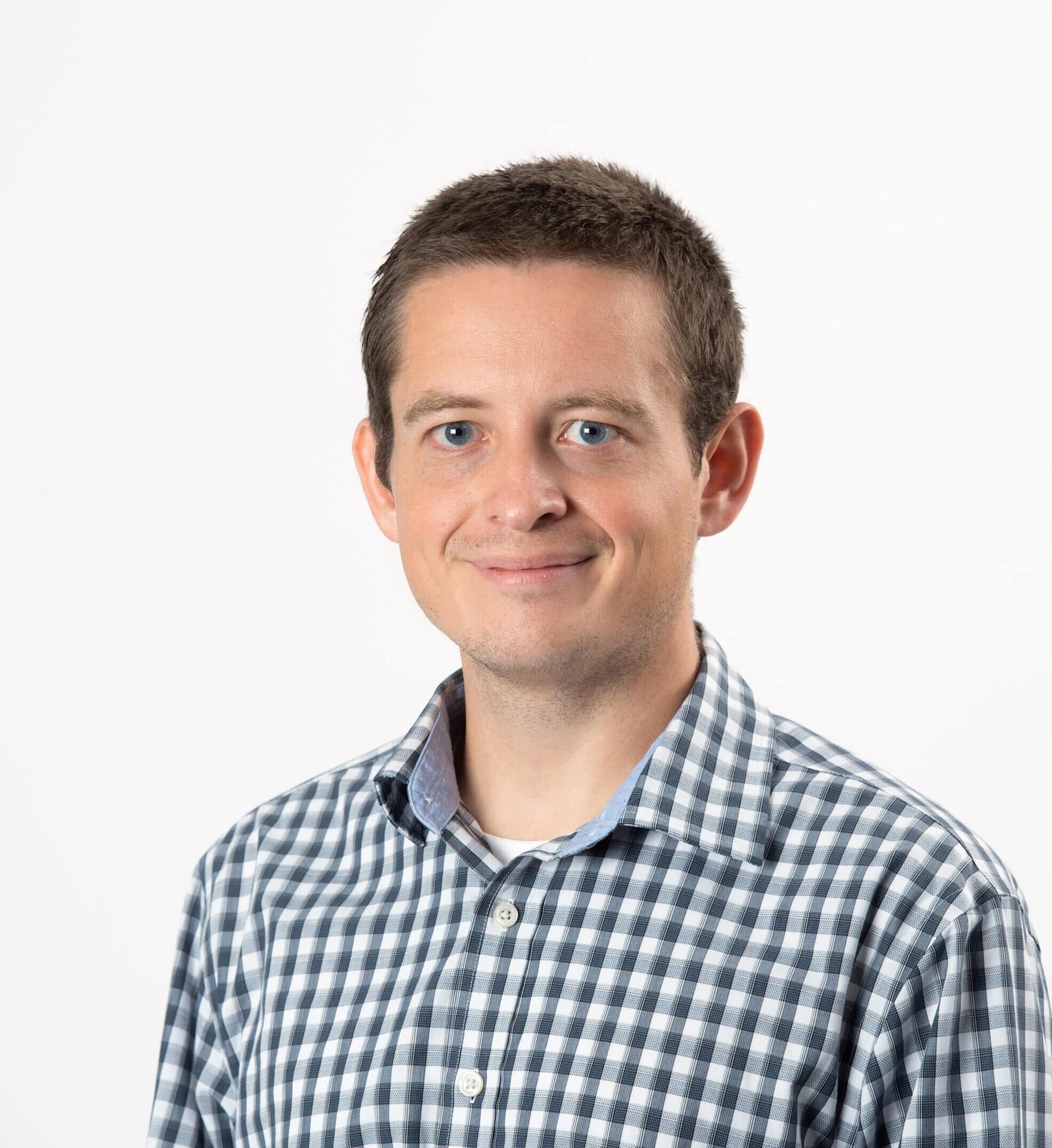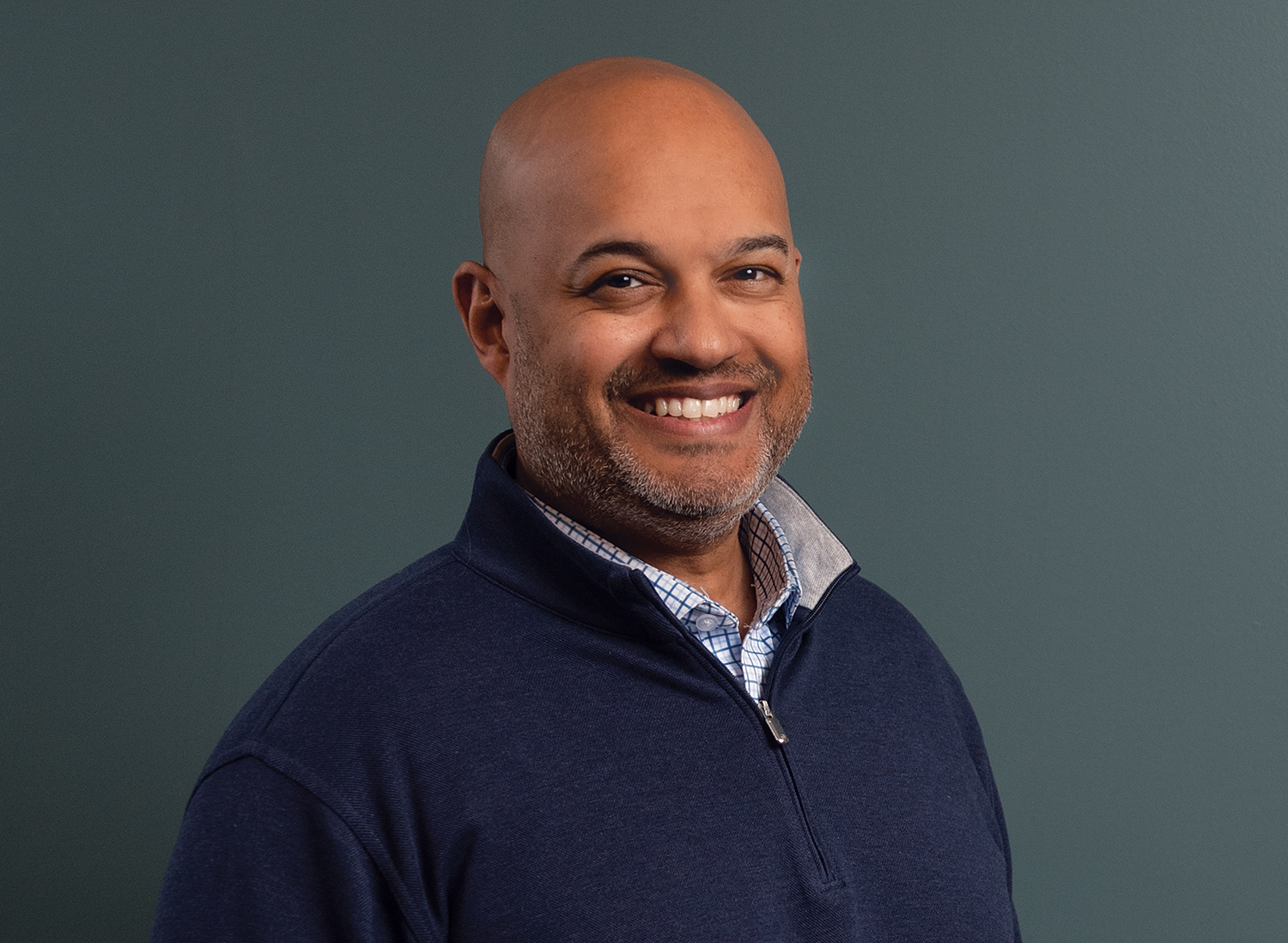A Closer Look: Nathan Simpson
CEO, Primary Health Care

As Primary Health Care moves forward with its third CEO in 43 years of existence and first new one in 24 years, Nathan Simpson is projecting continuity for the nonprofit community health center in Des Moines.
“To have that kind of legacy and then switch to a new CEO, I felt it was really important that people know that the organization is still the same,” said Simpson, who transitioned from chief operating officer to chief executive of PHC in December 2024. “The mission, the reason that we are here, the people who we are here to serve, that is not changing. I’ve been trying to provide that reassurance, provide that visibility to folks to know that I know you, you know me, PHC is still the same.”
That doesn’t mean PHC won’t seek opportunities to improve or make any changes, Simpson said, “but fundamentally we’re still the same organization.”
Since PHC was founded by Dr. Bery Engebretsen in 1981, the organization has been providing medical, dental and behavioral health services to the community, including those who face barriers to accessing care due to ability to pay, immigration status, or insurance.
Simpson has been with PHC for over 12 years, serving as clinic director and director of clinic operations before stepping into executive roles.
Before PHC, he worked as an inventory control and procurement specialist for Citigroup and he served nearly seven years in the U.S. Army.
The Business Record talked with Simpson about his journey to a career in health care, his 12 years of experience working for Primary Health Care, and his new role.
The Q&A has been lightly edited for brevity and clarity.
Will you share about your background, where you grew up, and how you became interested in health care?
I moved around a lot as a kid. Iowa born. I was born and raised for the elementary years in Fort Dodge and then really spent the rest of my childhood in Clear Lake. I moved there in the sixth grade and graduated from Clear Lake High School. Growing up in that small town environment and being part of a small community was really special. I went to college at Iowa State for a couple of years. I think, as is the case with a lot of folks, sometimes you just don’t have an end goal in mind, or a lot of focus necessarily on what’s next. I didn’t feel like I had a lot of direction in those college years, so I looked around at what other opportunities there were and ended up joining the Army in 2003, joined active duty and did my training. I ended up moving to Germany, and in that time, I got married, and my wife came over to Germany with me. We lived over there for about three years. I did a one-year deployment in Iraq in 2007 and then we moved back stateside. I did a little stint in the Army Reserves, but during that time, I was trying to figure out what to do in my adult life.
I took a corporate job working as a purchasing agent and started working on finishing my bachelor’s degree. I realized during that time that I really missed that sense of purpose and that sense of mission that the military provided, that sense of serving something and someone bigger than yourself. I started looking around for ‘Where can I recapture that feeling? Where can I get some of that sense of camaraderie that I’m missing?’ My wife was working in a labor and delivery unit, and just seeing the fulfillment that she had from that job and knowing the difference that she was making pointed me toward health care as that place to have that sense of purpose.
I knew I wasn’t necessarily going to be a clinician, so I looked at what other opportunities there were. I had finished my bachelor’s degree by that time and looked for opportunities for a health care administration degree. I started working on my master’s and then started applying at the typical places, the bigger hospital systems, the well-known places, and just kind of happened across a posting for Primary Health Care. I put my application in, but I wasn’t hired. It was an internal hire who was hired for our east side clinic, but the hiring manager was like, ‘Hey, we think you’d probably be a good fit here. If another opportunity comes along, would you apply again?’ About a month later, an opportunity came along to be the clinic director at our Bery Engebretsen clinic on the south side. So I put my application in and was hired and have been here ever since.
How have all the different positions you’ve had here at PHC prepared you to become CEO?
Looking back from this vantage point, it would have been really hard for me to step into this position without having gone through all of those really formative experiences. Starting as a clinic director and getting a sense for how a clinic works operationally on the ground, and then I pivoted from that Bery Engebretsen clinic to our residency clinic and kind of learned a different facet of our clinic operations. Then I got to take a step up and see things from a little different vantage point; still not the 30,000-foot-view, but really understanding, ‘How do you manage? How do you support all of the clinics together and what their individual needs are?’
When I shifted to the director of operations, I really stepped out of the clinics completely and learned more about our programs. We have a couple of really large grant-funded programs. We have the Project, which is our Ryan White HIV program, and then we have our Homeless Supportive Services program. Both of those are incredibly unique and serve in a different way than our clinics serve more traditionally. It was an opportunity to understand how the other half of our organization works, and additionally, I got to support our facilities team and other departments that I just hadn’t been exposed to in that way before. It really provided a more well-rounded understanding of what it takes to run this organization, and I think especially the impact of decisions that are made, what the impact is on the organization broadly and not just one facet of the organization.
What do you enjoy most about working for Primary Health Care?
Maybe aside from COVID, there wasn’t a time that I ever woke up and said I really dread coming to work. I have not had that; I’ve had that at other jobs, but I’ve never had that here, except for maybe COVID. First and foremost, it’s because of the mission. It’s because of who we serve and how we serve our patients, our clients, those who need services because we are truly unique in that regard. Everywhere has a mission statement and a vision statement and their values. PHC is the first place where I’ve worked that I feel like we really lean into that mission, and that drives everything that we do. I’m able to come to work and know that even though I’m not serving patients face to face, that I’m serving those who do, and that is an incredibly rewarding experience. And there’s a huge need. The way we serve our patients is unique, and I don’t know that there’s necessarily an organization like PHC in Central Iowa that kind of checks all the boxes that we check. That is something that definitely keeps me coming back, and the fact that I get to work with people who share that mindset every day — that sense of purpose, that sense of camaraderie, that sense of fulfillment that I was looking for — I found at PHC. And that is what has kept me here for the last 12 years and will keep me here until I retire.
How has the work changed since you first started, especially since the COVID pandemic?
Things have definitely changed since COVID. Since I started in 2012, our organization was about half the size then that it is now. We’ve gone through a tremendous amount of growth in the last 12 years. We’ve added clinics, we’ve added programs, we’ve added services, we’ve doubled our staff size, essentially. We’ve just had a lot of growth, which I think speaks to the need for those services in the community. I’ve been here from before Medicaid expansion to that unprecedented period we had with Medicaid expansion, where more people were qualified for insurance. And while we serve anybody regardless of their ability to pay, this meant that more patients were able to be referred on for other services that they may not have been able to access outside of PHC before. That was definitely a unique thing, and then COVID, of course, changed everybody’s operations and worldview.
There were definitely changes for the positive and changes for the negative. We were able to do some things as an organization that we weren’t able to do before. We’ve been able to stand up a new electronic health record (EHR) system that is really a truly integrated EHR between all of our services, instead of having our dental clinics in one system, our medical clinics in a different system. That’s been a big benefit. And then we’ve also seen people who have just left health care completely because that was a really challenging, trying time. There definitely have been a lot of people who have stayed and stayed because they have a heart for this work, who have a heart for health care. But unfortunately, there have also been people who have left because that was just a bridge too far. Health care was a taxing time, and it’s been something that all health care organizations have really been struggling with ever since it started.
Workforce has been a challenge really as a result of COVID, so I feel like we’re in a much better place than we were a couple years ago with staffing. We definitely struggled to attract registered nurses and certified medical assistants and some of those more clinical frontline staff, but that seems to have improved some. We were challenged to retain dentists or to recruit dentists. I don’t know if that’s necessarily a function of COVID, but it’s just a function of there is so much demand and not enough supply, and that is true for dentists, true for physicians. It’s true for most clinical services.
Is workforce currently the biggest challenge for Primary Health Care?
Workforce has definitely been our challenge, and we have done a lot of things to try to mitigate that challenge as much as possible. We have worked internally and with Iowa Primary Care Association to do some really innovative things. We have a number of our staff who have started out in the front office and have done on-the-job training and are now dental assistants. Some of them have progressed even past that. We’ve also partnered with the Primary Care Association to do medical assistant apprenticeships so folks who want to move from a nonclinical position to a medical assistant role go through the apprenticeship program, and then that culminates in them being a certified medical assistant. We’ve done a lot of different things to try to mitigate that as much as possible; it is still a challenge for us, and really I think for most health care organizations.
Is there a particular piece of advice or lesson you’ve learned that’s really stuck with you?
One of the most impactful things that I’ve learned in my career is that you can be right or you can be effective — to put it another way, you can insist on doing things your way, or you can focus on getting results. I’ve learned that being effective often means being flexible — understanding that my preferred approach isn’t always the best approach for the situation. Success comes from adapting, not just from being right in my own mind.
How would you describe your leadership style?
I think if you asked me that question years ago, I would have probably said one of the leadership styles that’s almost a cliche, like laissez-faire leadership, or one of those types. I think what I’ve come to learn over time is that my leadership style gets back to being right or being effective. It’s really situationally dependent. Not everybody responds to a certain type of leadership in the same way, and not everybody needs that type of leadership. I think fundamentally I’m a servant leader, and that is really what motivates me to come to work every day, and what my core leadership philosophy is. But in a more nuanced way, I think it’s important to just recognize what your team needs. Sometimes people need you to be really direct. Sometimes you have to be, nobody likes the term micromanager, but that is absolutely a style of leadership that is important in certain situations. It’s really recognizing what is needed in the situation and what that person needs in that situation, and flexing your style to meet their needs.
Is there a current book or recent book you’ve read that you’ve enjoyed?
I used to love to read fiction all the time. I was a voracious reader as a kid, probably because we didn’t have cable TV, so I would read all the time. Unfortunately as an adult, I’ve fallen out of that habit. I listen to more audio books, but I also don’t get to read as much fiction as I would like. The most recent fiction book that I read that I really enjoyed was ‘Project Hail Mary,’ which is in the works to become a movie, but if you haven’t read it, it’s a great book. And then I read a lot of leadership books. I just read ‘Death by Meeting’ by Patrick Lencioni. I try to find some nuggets to really apply to my work whenever I read those leadership books, but it seems like a ratio of 20 to 1, leadership books to fiction.
Is there anything else you want people to know about Primary Health Care, or about you specifically?
I want people to know of Primary Health Care. Too often I hear, one, ‘I had no idea that Primary Health Care existed,’ or, two, ‘I had no idea that you guys did that.’ We’re well-known in certain situations, like for a centralized intake and our Homeless Supportive Services program. But the people who know us in that way don’t necessarily know that we do all of these other things, that we have medical, dental, behavioral health, the HIV program, all of these services that we provide. I want people to know who we are, what we do, what we can provide, how we can benefit our community. Primary Health Care is a huge organization with a lot of different services that we provide. We don’t want to be a well-kept secret.
At a Glance
Hometown: Fort Dodge and Clear Lake
Education: Bachelor of arts in corporate communication from Simpson College; master of health care administration from Des Moines University
Family: Wife, Cassie, and two daughters, Ava and Olivia
Pets: Four cats and a dog, a leopard gecko, a rabbit and an axolotl
Hobbies: Traveling, including a yearly trip to Colorado, spending time with family, and reading

Kyle Heim
Kyle Heim is a staff writer and copy editor at Business Record. He covers health and wellness, ag and environment and Iowa Stops Hunger.










